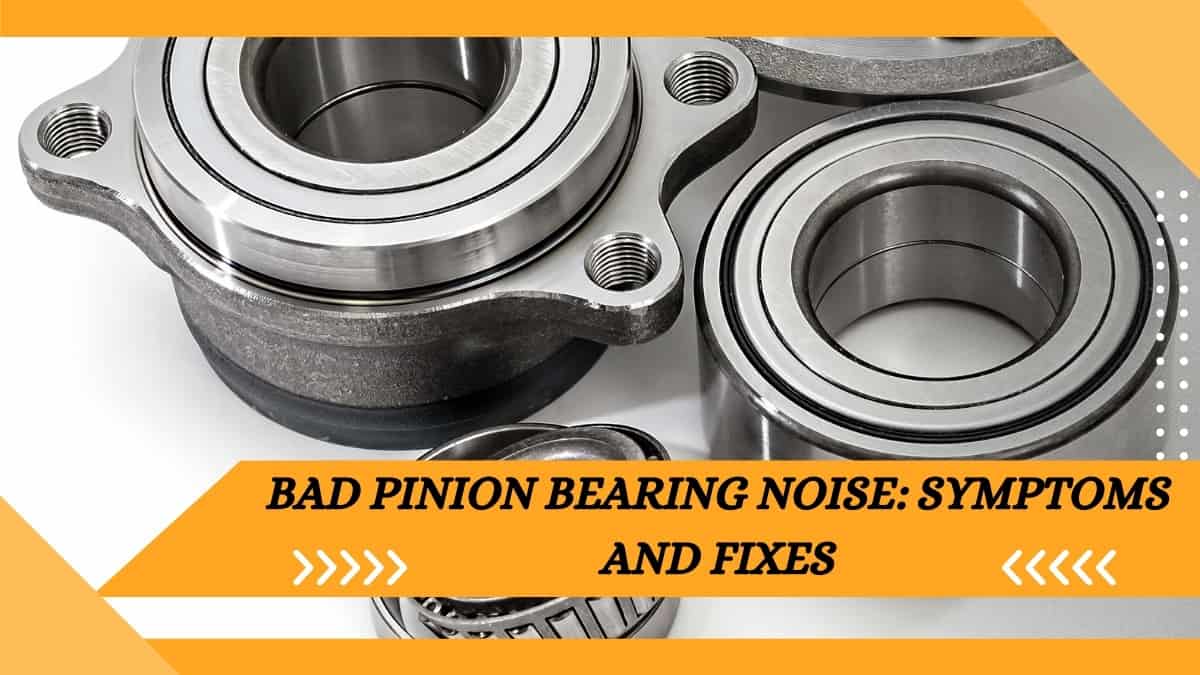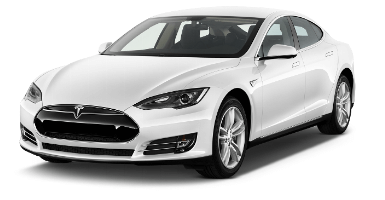
The problem of pinion-bearing noise affects more than 90% of drivers. A noisy pinion bearing can be a very frightening and annoying experience; it’s important to understand what the noise means and how to fix it.
Pinion bearings are the most important bearings in the suspension of the car. They’re required to transfer rotational force from the crank to the wheel, allowing the wheel to rotate and turn and the car to move forward.
Your car’s suspension relies heavily on pinion bearings, which can be very problematic when they malfunction. In this article, we’ll define pinion bearings, discuss their malfunctions, and offer solutions. Additionally, we’ll provide you with some advice on how to stop it from happening in the first place.
There are a few important signs that could point to a faulty pinion bearing in your car. It’s time to visit an auto care shop if you observe any of the following:
You can determine if your pinion bearing is damaged by how the engine sounds when you start it up. If you hear a shrieking or screeching sound, then you have probably damaged your pinion bearing and it is time to take your vehicle to a mechanic. This noise could be a sign that the pinion bearing in the engine is worn or damaged. If this happens, you need to replace the bearing before driving the car.
If your steering feels loose, your vehicle could pull to one side. Loose steering will also make it hard to turn the steering wheel. If you notice the steering wheel pulling to one side, have your vehicle checked by a mechanic. In extreme cases, defective bearings can damage the drive train. This could lead to steering problems, including a car pulling to one side or being difficult to turn.
If your vehicle is subject to vibrations, you may notice or feel them in the steering wheel, seat, or floor. When idling, you may feel a vibration from the pinion bearing that causes you to hear banging or grinding sounds. If the pinion bearing is damaged, you may hear a knocking or squeaking noise.
It’s crucial to get your car checked out right away if you notice pinion-bearing noise. You might be able to keep driving for a short while, depending on how loud the noise is. However, it’s essential to get your car repaired straight soon if the noise is loud or ongoing. It’s essential to have a pinion-bearing noise diagnosed so that the required repairs may be made because there are numerous potential causes for pinion-bearing noise. It’s practically hard to predict how long you can continue to drive with pinion-bearing noise.
Cars with rear-wheel drive and rack and pinion steering systems both use pinions. They are small gears that speed up the rotation of bigger gears, and pinion bearings improve the efficiency and smoothness of that revolution. You are hearing the bearing, which will begin to make loud whirring noises when it wears out. The steering wheel can be slightly more difficult to turn or result in early tyre wear if the pinion bearing entirely fails. It occasionally even has the potential to harm your driveshaft, differential, or gearbox. Even if that’s not always the case, you shouldn’t take a chance on a blown pinion bearing damaging other parts when it fails.
The pinion bearing is located where the drive shaft meets the differential. This bearing permits the drive shaft to rotate freely, allowing the differential to transmit power to the wheels.
If the pinion bearing malfunctions, numerous problems could occur. For instance, the car may move erratically if the driving shaft cannot rotate properly. Additionally, the car may stall or slow down if the differential cannot properly transfer power to the wheels.
Many things can cause a pinion gear to fail. The gear teeth are being overloaded, which is the most frequent cause. Numerous things, such as poor gear alignment, old or damaged bearings, or an overload on the gear train, might contribute to this. Inadequate lubrication, wear and tear, and manufacturing flaws are some more reasons why pinion gears fail.
The gear system may sustain significant harm if a pinion gear fractures. The gear train needs replacement if the damage is irreparable in specific circumstances. Other times, the damage could not be as serious, and the gear train might be able to be fixed.
The gear train must be disassembled to repair a broken pinion gear. It is necessary to remove the damaged gear and install a new one. The subsequent step involves properly aligning the new gear with the other gears in the train. Once the gear is installed, it is necessary to check the bearings and other parts for wear or damage.
It’s important to take your automobile to a professional to get it looked at if it is generating a loud pinion-bearing noise. The following advice can help you extend the life of your pinion bearings:
Ensure that the differential in your car is properly oiled. The differential in most cars is lubricated by a gear lube, which is a fluid that comes in a small bottle and is put into the gear lube container. Make sure to change the oil between every 3,000 and 5,000 miles.
Regularly check the pinion bearings for damage and wear. If you do not check and replace your pinion bearings regularly, they will eventually wear out. This can cause a loss of power and steering and will need to be replaced. A good way to check your pinion bearings is by checking them with a feeler gauge. Some pinions have a feeler gauge built into them.
If you want to get more from your bearings, you should immediately replace them if you notice any damage to them. This will be a good investment in your vehicle as it can save you from further damage in the future. Cheap bearings are not necessarily bad, but the chances of finding cheaper bearings that last longer are pretty low. At the very least, you’ll be able to save money and get better performance and longevity from your vehicle.
The most common failure mode for bearings is overheating. This can occur when the bearing is too close to the wheel or when the bearing is subject to excessive vibration or shock. To avoid overheating, lubricate the bearings. Inspect the bearing for chafing and rubbing on the chrome surface of the pinion shaft. If the bearing has become chafed, remove the bearing and smooth it out. Be sure to protect the bearing with lubricating oil.
If you must travel on unpaved roads, proceed cautiously to prevent overstressing the bearings.
There are a few things you may do to prevent bearing damage if your car is generating a loud pinion-bearing noise. Make sure the bearings are kept clean and clear of debris and routinely inspect the bearings for damage. Repair the bearings right away if you see any damage to them.
Pinion bearings are subjected to extensive stress. A pinion is subjected to a very high load, which is transferred to the pinion bearing. It is important to use the correct lubricant, ensuring that the grease is not lost. In addition to proper lubrication, you must also pay attention to the recommended intervals for an oil change. It is best to avoid overuse of the transmission and/or the engine, so it’s best to keep the car off the road if you won’t be using it for a while.
Reduce loads by either using a bearing with a higher load capacity or determining the maximum load the pinion bearing can support. Long-term use of a heavy load on the machine will eventually cause pinion-bearing failure. A pinion bearing that can handle the load is essential. Using the wrong pinion bearing could cause damage to the machine.
The engine mounts do a good job of keeping the engine from vibrating too much but can cause damage to the vehicle if not properly installed. The engine needs proper alignment, and if it’s not, make sure you refer to the manual to see if your engine has a special alignment tool to do the job.
There are a few things you may do to prevent bearing damage if your car is generating a loud pinion-bearing noise. To start, check sure the bearings are kept clean and clear of debris. Second, routinely inspect the bearings for damage. Third, repair the bearings right away if you see any damage to them.
You can maintain the pinion bearings in your car in good condition and avoid costly repairs by using these straightforward suggestions.
In the above little piece, we described what pinion bearings are, what problems they can cause, and how to fix them. It’s not unusual for a mechanic to encounter cars with noisy pinion bearings, but most of the time these are tricky to diagnose. Pinion-bearing noise is a problem that you can easily solve. However, it’s also something you want to solve as soon as possible. Your car relies on these bearings to function properly; diagnosing and fixing the problem quickly will keep it in top shape and safe for driving.
In the car’s suspension, pinion bearings are the most crucial. They are necessary to transmit rotational force from the crank to the wheel so that the wheel may turn and rotate and the car can move. It’s crucial to know what Pinion Bearing Noise is and how to fix it if your automobile has one.
Over time, pinion bearings may become worn down from routine use, a lack of lubrication, or damage from foreign objects. The problem fixes by replacing the pinion bearing, which might cost between $200 and $500.
Fill out the contact form and we will call you as soon as possible discuss events, membership or any general enquiries.
